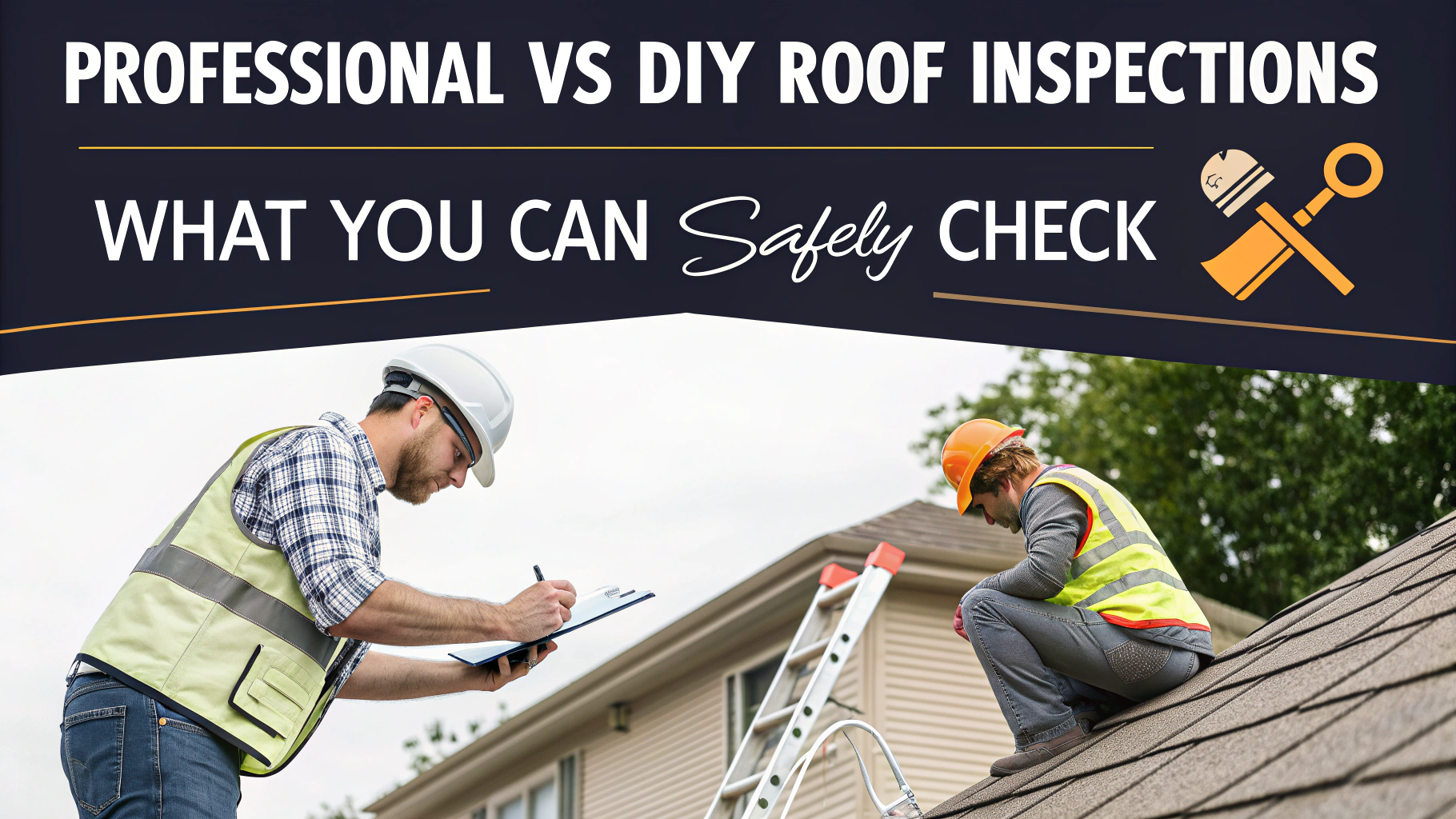Deciding between a professional roof inspection and a DIY check is an important choice for maintaining your Colorado home’s integrity and value.
Regular roof inspections help prevent costly damage and extend your roof’s lifespan in Colorado’s challenging climate, from heavy snow to intense UV exposure.
This guide outlines what homeowners can safely inspect themselves and when to call a professional roofer, helping you make informed decisions about your roof’s maintenance.
What You Can Safely Check Yourself
- Interior signs of roof problems:
- Water stains on ceilings
- Dark spots in attic
- Light showing through roof boards
- Sagging ceiling areas
- Ground-level exterior inspection:
- Missing or damaged shingles
- Curling or buckling shingles
- Excessive granule loss in gutters
- Visible moss or algae growth
When to Call a Professional
Any inspection requiring ladder use or roof access should be left to certified professionals.
- Complex inspection needs:
- Structural integrity assessment
- Ventilation system evaluation
- Flashing inspection around chimneys and vents
- Professional documentation for insurance claims
Recommended Inspection Schedule
| Inspection Type | Frequency |
|---|---|
| DIY Visual Check | Every 3-4 months |
| Professional Inspection | Annually or after severe storms |
Finding a Qualified Inspector
- Look for:
- Licensed and insured contractors
- Local references and reviews
- Experience with Colorado’s specific climate challenges
- Written inspection reports
Cost Considerations
Professional roof inspections in Colorado typically range from $200-$500, depending on roof size and complexity.
Taking Action After Inspection
- Document all findings with photos
- Keep detailed records of inspections and repairs
- Address minor issues promptly to prevent major problems
- Schedule follow-up inspections as recommended
Safety First: Your Roof, Your Responsibility
Remember that your safety is paramount – when in doubt, contact a professional roofing contractor for thorough inspection services.
For emergency roof inspections or professional services in Colorado, contact a licensed roofing contractor through the Colorado Roofing Association at (303) 484-0549.
Insurance Considerations
Many Colorado insurance providers require regular professional roof inspections to maintain coverage, especially in areas prone to severe weather events.
- Insurance requirements:
- Documentation of annual inspections
- Timely repair of identified issues
- Professional certification of work completed
- Photos of current roof condition
Seasonal Inspection Tips
Spring Checkpoints
- Winter damage assessment
- Gutter system cleaning
- Check for ice dam damage
- Inspect seals and flashing
Fall Preparation
- Clear debris from valleys
- Check attic ventilation
- Secure loose shingles
- Assess overall roof integrity
Common Colorado Roofing Challenges
- Environmental factors:
- Extreme temperature fluctuations
- High altitude UV exposure
- Heavy snow loads
- Hail damage potential
Protecting Your Roofing Investment
Regular maintenance and timely inspections are crucial for protecting your Colorado home. By combining DIY vigilance with professional expertise, you can maximize your roof’s lifespan and maintain your home’s value. Remember to document all inspections and repairs, stay current with maintenance schedules, and always prioritize safety over cost savings.
Contact your local roofing professional to schedule your next inspection and ensure your home remains protected against Colorado’s diverse weather conditions.
FAQs
- What are the key differences between professional and DIY roof inspections?
Professional inspectors have specialized equipment, training to spot subtle damage, insurance coverage, and can safely access all roof areas. DIY inspections are limited to visible issues from safe vantage points and ground-level observations. - How often should I have my roof professionally inspected in Colorado?
Professional inspections should be conducted twice yearly – typically in spring and fall – and after severe weather events like hailstorms or heavy snowfall. - What safety precautions should I take during a DIY roof inspection?
Never climb on a wet or steep roof, use a sturdy ladder secured properly, wear non-slip shoes, and avoid inspecting during windy or adverse weather conditions. Consider using binoculars from ground level. - What are signs of roof damage I can spot from the ground?
Missing or damaged shingles, sagging areas, visible dark spots, debris accumulation, and damaged flashing around chimneys or vents can be observed from ground level. - When is it absolutely necessary to call a professional roof inspector?
After severe storms, when you notice interior leaks, if your roof is over 15 years old, when selling your home, or if you spot significant visible damage. - What tools do professional roof inspectors use that DIYers typically don’t have?
Moisture meters, infrared cameras for detecting hidden leaks, core sampling tools, proper safety equipment, and specialized measuring devices for slope and material integrity. - What interior signs indicate I need a roof inspection?
Water stains on ceilings, musty attic odors, increased energy bills, visible light through roof boards, and sagging ceiling areas are signs requiring professional inspection. - How long does a professional roof inspection typically take in Colorado?
A thorough professional inspection usually takes 45 minutes to 2 hours, depending on roof size, complexity, and accessibility. - What specific challenges do Colorado roofs face that require professional attention?
Extreme temperature fluctuations, heavy snow loads, hail damage, UV exposure at high altitudes, and wind damage require specialized knowledge of local roofing requirements. - What should be included in a professional roof inspection report?
Detailed documentation of damage, photographs, measurements, estimated remaining roof life, repair recommendations, and cost estimates for necessary work.
